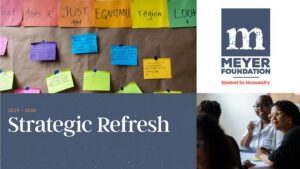Our Strategy
“...every individual has self determination and abundant opportunities. The region has a strong movement building ecosystem that ensures people are safe, policies reflect the needs of families, and resources are equitably distributed, fostering collective care.”
- Our community partners on a vision for a thriving region.
Learn more about our grantmaking
Find more information on how we partner toward a vision for a thriving region.

